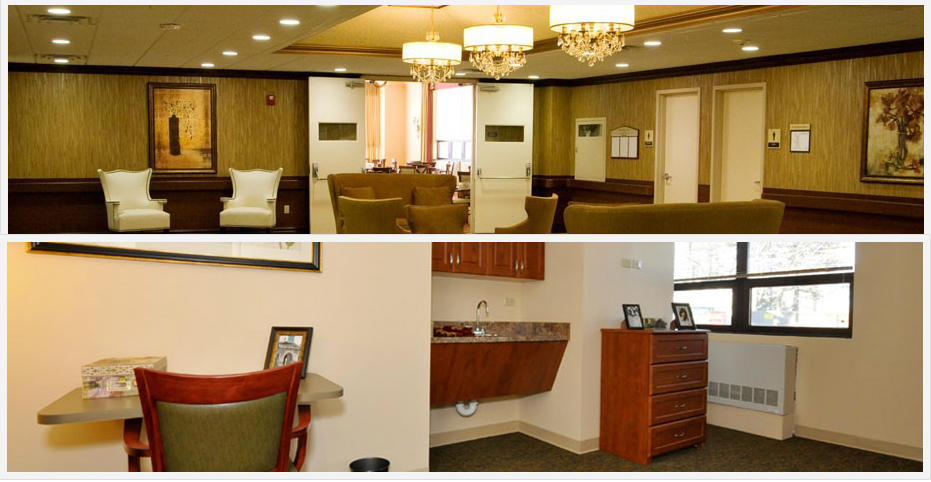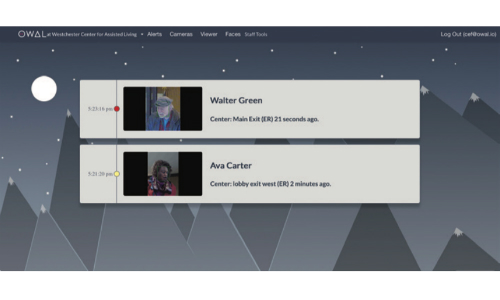The Westchester Center for Independent & Assisted Living in Yonkers, NY caters to approximately 200 seniors seeking an independent living community and those requiring help with activities of daily living and medication management.
The most critical objective of the center is to keep their residents safe and on a regular schedule. Both of these goals became a challenge by Spring of 2015 for Daniel Allen, the VP of construction and facilities with Center Management Group, who oversees the Westchester Center and other facilities around the country.
Center Management Group overcame these challenges by partnering with OWAL and deploying their AI Face Recognition solution.
Patient Elopement, Schedules Need Improvement
Patient elopement is a real fear and can put residents of the Westchester Center at risk of injury. The facility experienced a rise in dementia-related illness and was in search of a solution that would protect their residents from accidentally leaving the safety of the premises.
Another area of concern for the Westchester Center is keeping residents on schedule for their daily appointments, medications, meals and visitors. Residents rely on their preset schedules and expect things to run as planned, and get very anxious when they don’t.
This presented a challenge to staff members who had to find the resident instead of administering their medication at the scheduled time. The search often involved the help of other staff members including security to check the cameras.
“Caregivers would spend from six to twenty minutes looking for a resident who was not in their room when the nurse came to dispense their medication,” said Allen.
The process was inefficient and could put a resident at risk – especially during an elopement incident; the longer the resident went missing the more at risk they became. The search for a resident created a ripple effect of delays to the resident’s schedule.
Westchester Center Seeks Resident Tracking Solutions
Allen sought a solution that would unobtrusively track the location of residents at any time. Wireless personal tracking devices that residents could wear around the wrist or neck could do this, but devices would have required continual maintenance, charging and could easily be removed by the resident.
That meant a resident could be without a device for the duration of the charging time, and the resident required a second device while the first one was charging. Such a system also required installing wireless beacons throughout the 165,000 square foot facility.
Most importantly, the Center’s management values the quality of life and felt that subjecting seniors to these undignified devices goes against these values.
Westchester Center Settles On OWAL Solution
Allen already had a camera system installed to monitor the safety of residents both inside and outside the facility. The cameras required a dedicated person at the security desk to watch 24/7 while also assisting other staff.
He quickly learned that more time was spent looking into incidents versus watching for live security risks and that expecting one security guard to monitor more than 30 cameras was simply not feasible.
Allen was familiar with OWAL, a company based out of New York City that provides Artificial Intelligence and Facial Recognition solutions for commercial and residential buildings by delivering real-time actionable insights through the use of camera analytics.
Allen partnered with OWAL to implement the platform, through which his cameras became proactive data collection devices that report the whereabouts of residents at the Westchester Center at any time.
OWAL was able to implement a solution quickly using cameras that Westchester Center already had installed in common areas. Additional cameras were installed inside the building to better capture the residents in wheelchairs, seated, or those leaning over their walkers and outside the building.
Facial Recognition Solves Westchester’s Problems
Once the system was set up – the camera took a few attempts to capture various angles of people’s faces to recognize them – and captured this information permanently into its database.
Once the database of faces is stored, the cameras recognize individuals at all camera locations – allowing staff to confirm a resident’s location. As new residents come in, the system learns their faces and logs them into the database.
OWAL software solutions provide real-time notifications of residents at risk of wandering. If a resident accidentally gets out of their domain, an alert is sent to security and management to notify them of a potential elopement. Examples range from residents entering an elevator, exiting their floor or even their building. When this happens, the staff can see the cameras on the monitor and receive text alerts on their phones or inside messaging apps such as Slack or Google Hangouts. Alerts have also been set up when residents wander into certain outdoor areas where they shouldn’t be.

The Westchester Center offers patients several amenities in each room as well as an elegant common area. Photo via OWAL
Westchester Staff, Visitors Buy Into Facial Recognition System
The staff has embraced the new technology because they no longer spend their shifts searching for residents, allowing them to save time and focus on resident care. Furthermore, during incidents of suspected elopement, specific staff members will now receive an alert to initiate a search.
Families are aware that cameras are for the safety of their loved ones and understand their importance. The Westchester Center prides itself on the privacy of their residents and does not have any cameras in their rooms or in any of the staff break areas.
Overall the solution proved to be more cost-effective for the Westchester Center when compared to investing in wireless tracking devices or similar solutions. Each camera became a 24/7 sentry that alerts the staff of any unexpected behavior of residents.
Westchester Moves Forward After The Upgrade
Allen is determined to make his assisted living facilities the best in class and realizes he must be forward thinking and continually empower his staff with resources to make decisions. If staff is spending their time searching for residents, they will become stressed and lose focus.
It’s not about adding or subtracting staff – it’s about utilizing existing staff more efficiently and letting them focus on the care of their residents.
Together they were able to streamline operational efficiencies and provide families with the confidence that their loved ones are receiving the best in care with cloud-based analytic solutions.
The Westchester Center for Assisted Living will be implementing fall detection and people counting in its next phase. The staff will receive alerts when residents are lying on the floor for any reason. This alert facilitates an immediate investigation.
People counting will offer insights into the number of people walking in a hallway or the number of visitors. This data will assist the Westchester Center in offering best in class service by managing property operations and preparing for the future.
Due to the success of the OWAL solution at the Westchester Center, the Center Management Group will be deploying the system at other assisted living facilities.
Facial Recognition, Patient Tracking Solutions Bolster Role of Assisted Living Facilities
Not only is the OWAL cloud-based solution providing residents and families with a sense of security that their loved ones are in good hands, but the solution equips assisted living facilities to take on mild dementia patients that previously were sent to more costly facilities such as nursing homes. This new technology solution offers families an alternative to nursing care.
Ultimately, the goal is to give residents quality of life – and together the Westchester Center for Assisted Living and OWAL are working to deliver a greater degree of freedom to patients as they age.
About OWAL
OWAL is a start-up in NYC founded in 2015 by a team of former Google and Fortune 500 veterans that created an AI Computer Vision platform for buildings and those who manage properties. We provide solutions that convert IP cameras into AI devices that record, store, analyze and alert managers of anomalies in their spaces. Our event and behavioral detection and facial recognition protect people and properties while enhancing building operations. OWAL targets Residential, Commercial, and Assisted Living buildings with single or multi-property portfolios that need a sophisticated,low-costt alternative to operational surveillance. OWAL customized solutions leverage a cost- per-camera model available through distribution and integration partners.







